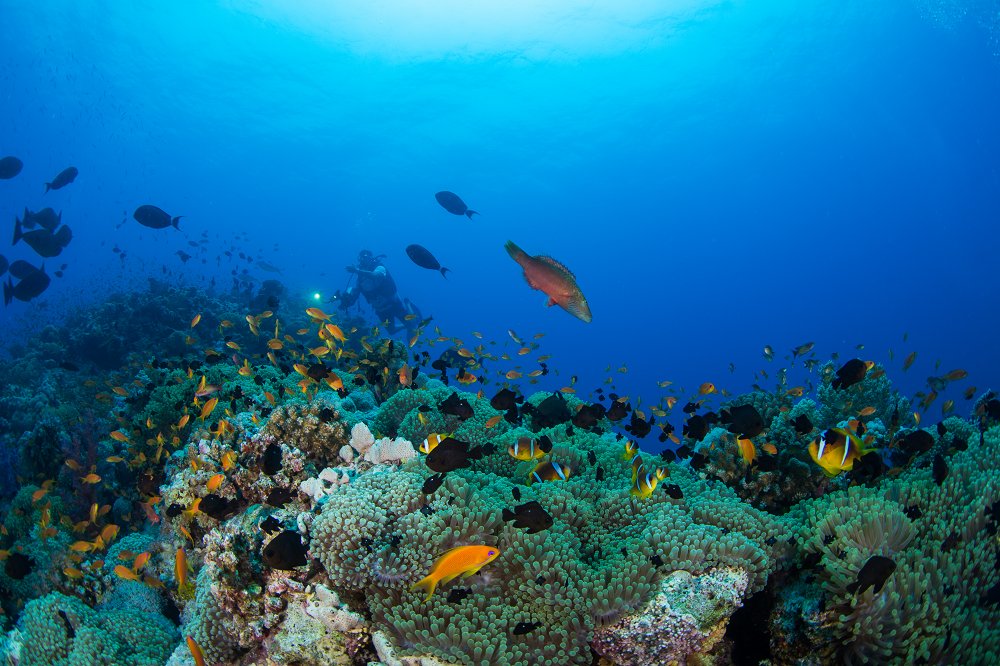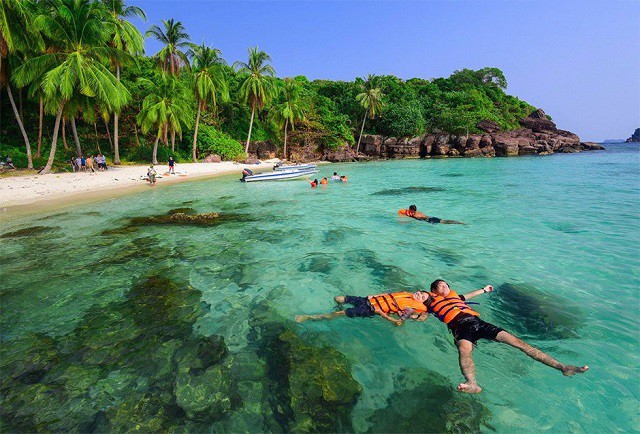
Explore the Wonders of the Red Sea
Ever dreamt of discovering the breathtaking depths of the Red Sea? Jeddah is your gateway to an extraordinary scuba diving experience, where stunning coastal beauty meets vibrant marine life. Immerse yourself in crystal-clear waters teeming with over 1,200 species of marine creatures, including the swift sailfish and the majestic Napoleon wrasse, often hailed as the "queen of the coral reefs."

Year-Round Diving Paradise
With 500 dive spots and warm, inviting waters, the Red Sea is perfect for diving any time of year! Spring is especially magical, offering mild weather and peak underwater visibility. The gentle currents make it ideal for divers of all skill levels, ensuring a smooth adventure as you explore this underwater paradise.
Perfect for Everyone
Jeddah’s diving experiences cater to all! Families can snorkel to witness colorful marine life up close, while friends can dive into thrilling wreck sites and vibrant coral reefs. Plus, enjoy a range of water activities like surfing, kayaking, and freediving—there's something for every water enthusiast!

Hidden Gems Await
🌊 Sharm Obhur: Swim with sea turtles and spot the vibrant clownfish in this stunning northern dive destination, located just a short drive from central Jeddah. Renowned for its rich biodiversity and colorful coral gardens, Sharm Obhur offers shallow reefs perfect for beginners and deeper sites for the adventurous.

🏝️ Abu Tair Island: Dive into history at the wreck of the Greek ship Stavronisos, situated in the southwest corner of Jeddah. This area, known for its stunning underwater landscape adorned with cables and remnants of the wreck, is a sanctuary for diverse marine life. It's also a favorite for macro photography, where you can capture tiny critters in their natural habitat.

⚓ “Ann Ann” Wreck Site: Capture unforgettable moments at this historical dive site, located in the Abu Faramish area. Here, remnants of the ship blend with thriving marine ecosystems, offering a unique view of how nature reclaims human creations. It's an ideal spot for photography, with colorful corals enveloping the wreck and schools of fish darting around.

🐋 Mount Laith Island: Located south of Jeddah, this remote island is famous for hosting the largest gatherings of whale sharks in crystal-clear waters. The vibrant coral reefs and stunning underwater scenery make it a perfect spot to relax after an exhilarating dive, with sandy beaches that invite you to unwind.

Why Choose Jeddah for Your Diving Adventure?
-
Unmatched Biodiversity: Encounter rare species and breathtaking marine life that can’t be found anywhere else, including vibrant corals, majestic rays, and even the elusive hammerhead shark.
-
World-Class Facilities: Jeddah is equipped with top-notch diving schools, gear rentals, and experienced instructors to ensure a safe and enjoyable experience. Many dive centers offer tailored packages, including guided tours and night dives.
-
Vibrant Culture: After a day of diving, explore Jeddah’s rich culture. Visit the historic district of Al-Balad, where traditional architecture and bustling souks await, or indulge in delicious local cuisine at waterfront restaurants that showcase the flavors of the Red Sea.
-
Perfect Climate: With warm waters and sunny skies year-round, Jeddah’s climate is ideal for diving. The gentle breezes and mild temperatures make for a comfortable experience above and below the water.

Tips for a Successful Diving Experience
-
Check Certification Requirements: Ensure you have the appropriate diving certification. Many dive shops offer introductory courses for beginners.
-
Dive Insurance: Consider purchasing dive insurance for peace of mind, covering potential accidents or equipment loss.
-
Respect Marine Life: Follow best practices for marine conservation. Avoid touching or disturbing wildlife and refrain from collecting souvenirs from the ocean floor.
-
Stay Hydrated: Drink plenty of water before and after dives to avoid dehydration, which can affect your diving experience.
-
Plan for Weather Conditions: Check local weather and sea conditions. Some sites may be affected by currents or visibility issues, so flexibility in your plans can enhance your experience.

Scuba diving tours from Jeddah open the door to a world of wonder beneath the surface of the Red Sea, offering experiences that blend adventure, natural beauty, and cultural discovery. Whether you’re a first-time snorkeler or a seasoned diver, the region’s warm waters, abundant marine life, and diverse dive sites promise unforgettable memories.
From exploring vibrant coral reefs and historic shipwrecks to swimming alongside majestic whale sharks, each dive reveals a new facet of the Red Sea’s magic. With its commitment to safety, conservation, and inclusivity, Jeddah has truly established itself as a premier destination for underwater exploration. Embark on a scuba diving tour here, and you’ll not only escape the hustle and bustle of city life—you’ll return with a deeper appreciation for the ocean’s wonders and a sense of awe that lasts long after you resurface.

.jpg)
.jpg)
.jpg)
.jpg)
.jpg)



.jpg)
.jpg)



.jpg)
.jpg)
.jpg)



.jpg)
.jpg)
.jpg)







.jpg)
.jpg)






.jpg)

.jpg)








.jpg)


.jpg)






.jpg)
.jpg)